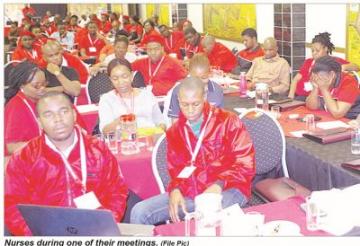MINISTRY OF HEALTH ADMITS CHALLENGES

MBABANE – The Ministry of Health has finally admitted that it has a truckload of challenges.
These vary from drug stock-outs, failure to pay suppliers, fuel shortages and reduced quality of patient stay at facilities.
All these challenges were admitted to by the Minister of Health, Lizzie Nkosi, before the ministry’s House of Assembly Portfolio Committee. The challenges were listed in about three pages of the minister’s preamble.
When giving her written down preamble, the minister went as far as mentioning that the ministry still had arrears of E132 million for Anti-Retroviral (ARV) medication. Nkosi reported that they had been unable to pay some suppliers for services which were rendered in 2018/2019 due to cash flow challenges and they now had to settle the debts using the 2019/2020 budget.
She said most affected by the situation were the ARV medication, which dated back to the last financial year. All these were attributed to the fiscal challenges faced by government.
“The ministry is now having to settle these bills from the 2019/20 budget and creating a shortfall in the current year’s budget,” she said.
Problems
The minister said they were now in the process of settling the old bills and had to deal with problems which include having the National Tender Board to extend the validity period of the last financial year tenders, so as to facilitate payment of suppliers.
She told members of her portfolio committee that they would shortly be finalising the current year’s tenders for ARVs, where they had to negotiate prices for one of the medicines since the ministry was not satisfied with the received offer.
She said they had to negotiate because the price of one of the ARV medicines being offered to government was way above the normal price, even internationally.
Nkosi said negotiating a tender price in government required special permission from the National Tender Board. She said the process had further delayed the placement of ARV orders, but the ministry was hoping to finalise the process soon so as to place orders to replenish stock. Over a month ago, the minister had told parliamentarians that there had been about four months stock of ARVs left, which could mean that currently there was three months stock available.
The ministry has since rolled out a new HIV treatment regime known as TLD, whereby those on treatment would only have to take one tablet per day.
The pill is a once-a-day generic fixed-dose combination of tenofovir disoproxil fumarate, lamivudine, and dolutegravir (TLD).
The minister further told the portfolio committee, which is chaired by Maseyisini MP Mduduzi ‘Small Joe’ Dlamini that all health facilities had reported frequent medicine stock-outs which had affected the management of their patients negatively.
“While the majority of patients were negatively affected, highly impacted patients were those on psychiatric medication, which stocked out for longer periods and those taking anti-hypertensive treatment,” she said.
Nkosi said the main cause for stock-outs was failure to pay suppliers on time due to the fiscal challenges faced by the government. The minister further said most health facilities had been negatively affected by the delayed payment and subsequent withdrawal of services by service providers.
She said these included catering, security, servicing of medical equipment and cleaning materials.
Others were external referrals, clinic management information system (CMIS) rollout, protective supplies and others.
Quality
Nkosi said this had negatively affected the provision of health services and reduced in particular the quality of patient stay at facilities.
“Some of the most affected facilities are Mbabane Government Hospital and Nhlangano Health Centre, particularly with regard to catering and security,” said the minister.
Nkosi told the committee that all facilities had also reported shortages in human resources due to delays in refilling vacant posts and failure to get additional new posts where new services had been added.
She said of particular note were the health centres which had expanded their infrastructure and required additional nurses, doctors and anaesthetists to run the new maternity wings including theatres.
Nkosi said the ministry had managed to fill 32 of the 70 positions approved by Cabinet for recruitment during the quarter.
“However, interviews have been conducted for all the remaining posts and their filling will be finalised soon,” she reported.
Under the Phalala Fund, the minister said they were currently sitting at E94 million arrears which included arrears from the last fiscal year and expenditure incurred in this quarter.
The minister said at the beginning of the fiscal year, they had received a budget of E97 million for the fund.
She said the country had reduced Phalala external referrals and out of 58 referrals to South Africa about 78 per cent of them were cancer-related.
The minister said a total of E481 332 949 had been released for the past quarter and E355 936 217 was spent.
She said the rest of the funds had already been committed, but had not yet been paid out to service providers due to cash flow challenges and the fact that some deliveries had not been completed.




 del.icio.us
del.icio.us Digg
Digg
Comments (0 posted):